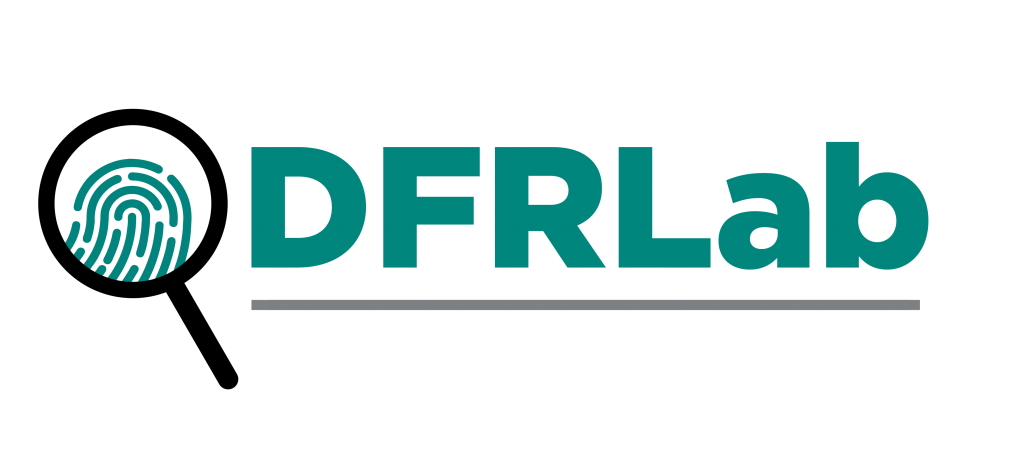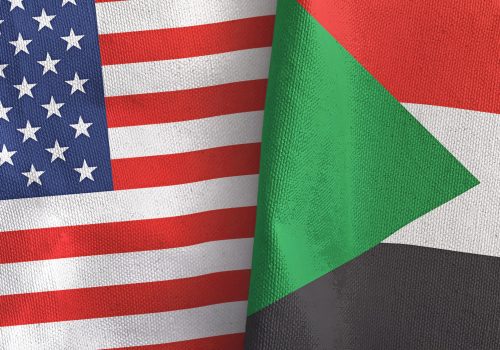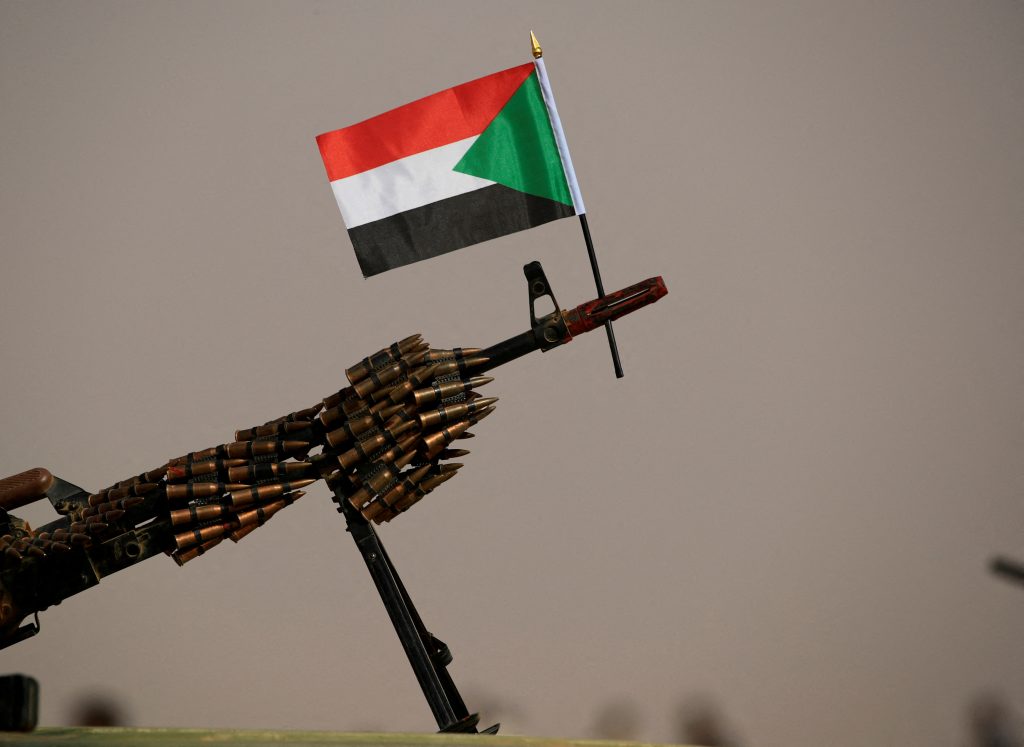Sudan’s precarious information environment and the fight for democracy
Executive summary
In recent years, Sudan has seen significant political upheaval, from the 2019 ouster of autocratic ruler Omar al-Bashir and the October 2021 military coup that unseated the transitional government, to the outbreak of violent conflict between the Sudanese Armed Forces (SAF) and the paramilitary Rapid Support Forces (RSF) in April 2023. The result is a country—and its hopes for a democratic transition—now derailed, despite years of civil protests that themselves were disrupted by police maneuvering and the threat of full-blown civil war. This societal discord is manifested not just in real life but also in the country’s online information environment. This report examines the state of digital affairs in Sudan in the lead-up to the current conflict, focusing on the period from the October 2021 coup through December 2022.
While online networks played a crucial role in exposing brutalities committed by al-Bashir’s security apparatus and in organizing protests, almost 70 percent of the Sudanese population remained offline as of January 2022.
Despite less than a third of the country having access to the internet, both the al-Bashir regime and the subsequent ruling councils viewed online communication as a potentially dangerous tool in the hands of protesting citizens. Between December 2018 and December 2022, Sudanese citizens were subjected to 138 days of internet disruptions.
Overall, the legal infrastructure was typical of autocratic regimes in that it was designed to limit free speech and enable punitive actions against dissenters and opposition figures. Authorities used deliberately vague laws to enforce internet disruptions and confiscate protesters’ cell phones. For example, the Criminal Act of 1991 criminalized the spreading of false information, while the 2020 amendment to the Cybercrimes Law, which was passed in secret, made the spread of disinformation punishable with up to four years in prison, flogging, or both. While many laws from al-Bashir’s time remain in place, there have also been tangible improvements to Sudan’s legal infrastructure since his removal. Independent citizens took to the courts to fight against internet shutdowns, and journalists defied the Press and Publications Act to create a media union.
Sudan’s National Intelligence and Security Service formed a Cyber Jihad Unit to monitor online dissent and spread disinformation. During the 2018–19 protests that led to al-Bashir’s ouster, internal disinformation from the regime painted protesters as violent. After al-Bashir’s removal, internal campaigns worked to promote the military apparatus and target the transitional government.
Yet activists who spoke to the authors indicated they were primarily concerned with being identified by intelligence agents for sharing legitimate evidence of violence committed against protesters. Despite the danger, activists used Facebook Live to stream evidence of the regime’s brutality and ensured the evidence could not be easily dismissed as old or fake by including the time, date, and location of incriminating incidents in social media posts.
An important form of online resistance took place on women-only Facebook groups. Previously used to identify cheating men, the groups turned into investigative platforms where women posted images of suspected plain-clothed members of the intelligence services accused of abusing protesters. The groups were so successful at unearthing personal information about undercover intelligence officers that many officers took to wearing masks to hide their identities.
Foreign entities orchestrating disinformation campaigns primarily focused on promoting their relationship with Sudan or pushing Sudanese politics in a way to their own benefit. Yevgeny Prigozhin, who oversees Russian private military company the Wagner Group, told al-Bashir to spread disinformation depicting protesters as violent, while later Russian campaigns focused on promoting Russia’s own interests around a naval base in Port Sudan. Public relations firms from Gulf states that were supportive of the coup that toppled al-Bashir spent thousands of dollars promoting the military, seeing a greater opportunity of a beneficial relationship with the latter.
Meanwhile, rumors spread offline posed a threat to grassroots organizations that struggled to combat false information shared via word of mouth. Sudan’s unique information environment features a combination of a media ecosystem attempting to build a trustworthy reputation after years of censorship, a legal system designed to limit it further, and, despite these things, a populace striving toward greater governmental representation and democracy in spite of the autocratic rivalries that have violently hijacked it. In light of the ongoing conflict, with Sudanese civil society caught in the middle, the near horizon remains bleak, but in the long term, only greater transparency and accountability around the free flow of information in conjunction with a cessation in violence will provide the stepping stones necessary to build a resilient democracy in Sudan.
الملخص التنفيذي
ﻓﻲ اﻟﺴﻨﻮات اﻷﺧﻴﺮة، ﺷﻬﺪ اﻟﺴﻮدان اﺿﻄﺮاﺑﺎت ﺳﻴﺎﺳﻴﺔ ﻛﺒﻴﺮة، ﻣﻦ اﻹﻃﺎﺣﺔ ﺑﺎﻟﺤﺎﻛﻢ اﻻﺳﺘﺒﺪادي ﻋﻤﺮ اﻟﺒﺸﻴﺮ ﻓﻲ ﻋﺎم ،٢٠١٩واﻧﻘﻼب ٢٠٢١اﻟﺬي أﻃﺎح ﺑﺎﻟﺤﻜﻮﻣﺔ اﻻﻧﺘﻘﺎﻟﻴﺔ، ﻹﻧﺪﻻع اﻟﺼﺮاع اﻟﻌﻨﻴﻒ ﺑﻴﻦ اﻟﻘﻮات اﻟﻤﺴﻠﺤﺔ اﻟﺴﻮداﻧﻴﺔ وﻗﻮات اﻟﺪﻋﻢ اﻟﺴﺮﻳﻊ اﻟﺸﺒﻪ ﻋﺴﻜﺮﻳﺔ ﻓﻲ اﺑﺮﻳﻞ .٢٠٢٣ﻣﻤﺎ أﺛﻤﺮ ﻋﻦ ﺧﺮوج اﻟﺪوﻟﺔ ﻋﻦ ﻣﺴﺎرﻫﺎ وآﻣﺎﻟﻬﺎ ﻓﻲ اﻟﺘﺤﻮل اﻟﺪﻳﻤﻘﺮاﻃﻲ، ﻋﲆ اﻟﺮﻏﻢ ﻣﻦ ﺳﻨﻮات ﻣﻦ اﻻﺣﺘﺠﺎﺟﺎت اﻟﻤﺪﻧﻴﺔ اﻟﺘﻲ ﺗﻌﻄﻠﺖ ﻫﻲ ﻧﻔﺴﻬﺎ ﺑﺴﺒﺐ ﻣﻨﺎورات اﻟﺸﺮﻃﺔ واﻟﺘﻬﺪﻳﺪ ﺑﺤﺮب أﻫﻠﻴﺔ ﺷﺎﻣﻠﺔ. ﻻ ﺗﻨﺤﺴﺮ اﻧﻌﻜﺎﺳﺎت ﻫﺬا اﻟﺨﻼف اﻟﻤﺠﺘﻤﻌﻲ ﻋﲆ اﻟﺤﻴﺎة اﻟﻮاﻗﻌﻴﺔ ﻓﺤﺴﺐ، ﺑﻞ أﻳﻀً ﺎ ﻋﲆ ﺑﻴﺌﺔ اﻟﻤﻌﻠﻮﻣﺎت ﻋﺒﺮ اﻹﻧﺘﺮﻧﺖ ﻓﻲ اﻟﺪوﻟﺔ. ﻳﺘﻨﺎول ﻫﺬا اﻟﺘﻘﺮﻳﺮ ﺣﺎﻟﺔ اﻟﻤﺠﺎل اﻟﺮﻗﻤﻲ ﻓﻲ اﻟﺴﻮدان ﻓﻲ اﻟﻔﺘﺮة اﻟﺘﻲ ﺳﺒﻘﺖ اﻟﺼﺮاع اﻟﺤﺎﻟﻲ، ﻣﻊ اﻟﺘﺮﻛﻴﺰ ﻋﲆ اﻟﻔﺘﺮة ﻣﻦ اﻧﻘﻼب أﻛﺘﻮﺑﺮ ٢٠٢١ﺣﺘﻰ دﻳﺴﻤﺒﺮ ٢٠٢٢.
ﻓﻲ اﻟﻮﻗﺖ اﻟﺬي ﻟﻌﺒﺖ ﻓﻴﻪ ﺷﺒﻜﺎت اﻹﻧﺘﺮﻧﺖ دورا ًﺣﺎﺳﻤًﺎ ﻓﻲ ﺗﻨﻈﻴﻢ اﻻﺣﺘﺠﺎﺟﺎت واﻟﻜﺸﻒ ﻋﻦ اﻷﻋﻤﺎل اﻟﻮﺣﺸﻴﺔ اﻟﺘﻲ ارﺗﻜﺒﻬﺎ ﺟﻬﺎز أﻣﻦ اﻟﺒﺸﻴﺮ، ﻇﻞ ﻣﺎ ﻳﻘﺮب ﻣﻦ ٪٧٠ ﻣﻦ ﺳﻜﺎن اﻟﺴﻮدان ﻣﻨﻘﻄﻌﻴﻦ ﻋﻦ اﻻﻧﺘﺮﻧﺖ اﻋﺘﺒﺎرًا ﻣﻦ ﻳﻨﺎﻳﺮ ٢٠٢٢.
ﻋﲆ اﻟﺮﻏﻢ ﻣﻦ أن أﻗﻞ ﻣﻦ ﺛﻠﺚ اﻟﺴﻜﺎن ﻳﻤﻠﻜﻮن إﻣﻜﺎﻧﻴﺔ اﻟﻮﺻﻮل إﱃ اﻹﻧﺘﺮﻧﺖ، اﻋﺘﺒﺮ ﻛﻞ ﻣﻦ ﻧﻈﺎم اﻟﺒﺸﻴﺮ واﻟﻨﻈﻢ اﻟﺤﺎﻛﻤﺔ اﻟﻼﺣﻘﺔ أن اﻻﺗﺼﺎل ﻋﺒﺮ اﻹﻧﺘﺮﻧﺖ أداة ﺧﻄﺮة ﻓﻲ أﻳﺪي اﻟﻤﻮاﻃﻨﻴﻦ اﻟﻤﺤﺘﺠﻴﻦ. ﺑﻴﻦ دﻳﺴﻤﺒﺮ ٢٠١٨ ودﻳﺴﻤﺒﺮ ،٢٠٢٢ﺗﻌﺮض اﻟﻤﻮاﻃﻨﻮن اﻟﺴﻮداﻧﻴﻮن إﱃ ١٣٨ﻳﻮﻣًﺎ ﻣﻦ اﻧﻘﻄﺎع اﻹﻧﺘﺮﻧﺖ.
ﻋﻤﻮﻣﺎً، ﻛﺎﻧﺖ اﻟﺒﻨﻴﺔ اﻟﺘﺤﺘﻴﺔ اﻟﻘﺎﻧﻮﻧﻴﺔ ﻧﻤﻮذﺟﻴﺔ ﻟﺨﺪﻣﺔ اﻷﻧﻈﻤﺔ اﻻﺳﺘﺒﺪادﻳﺔ ﻣﻦ ﺣﻴﺚ أﻧﻬﺎ ﻣﺼﻤﻤﺔ ﻟﻠﺤﺪ ﻣﻦ ﺣﺮﻳﺔ اﻟﺘﻌﺒﻴﺮ وﺗﻤﻜﻴﻦ اﻹﺟﺮاءات اﻟﻌﻘﺎﺑﻴﺔ ﺿﺪ اﻟﻤﻌﺎرﺿﻴﻦ. ﺣﻴﺚ وﻇﻔﺖ اﻟﺴﻠﻄﺎت ﻗﻮاﻧﻴﻨﺎً ﻏﺎﻣﻀﺔ ﻋﻦ ﻋﻤﺪ ﻟﻔﺮض ﺗﻌﻄﻴﻞ اﻹﻧﺘﺮﻧﺖ وﻣﺼﺎدرة اﻟﻬﻮاﺗﻒ اﻟﻤﺤﻤﻮﻟﺔ ﻟﻠﻤﺘﻈﺎﻫﺮﻳﻦ. ﻋﲆ ﺳﺒﻴﻞ اﻟﻤﺜﺎل، ﻳﺠﺮّم اﻟﻘﺎﻧﻮن اﻟﺠﻨﺎﺋﻲ ﻟﻌﺎم ١٩٩١ﻧﺸﺮ اﻟﻤﻌﻠﻮﻣﺎت اﻟﻜﺎذﺑﺔ، ﻓﻲ ﺣﻴﻦ أن ﺗﻌﺪﻳﻞ ﻋﺎم ٢٠٢٠ ﻟﻘﺎﻧﻮن اﻟﺠﺮاﺋﻢ اﻹﻟﻜﺘﺮوﻧﻴﺔ، واﻟﺬي ﺗﻢ إﻗﺮاره ﺳﺮاً، أﻗﺮ أن ﻋﻘﺎب ﻧﺸﺮ اﻟﻤﻌﻠﻮﻣﺎت اﻟﻤﻀﻠﻠﺔ ﻫﻮ اﻟﺴﺠﻦ ﻟﻤﺪة ﺗﺼﻞ إﱃ أرﺑﻊ ﺳﻨﻮات أو اﻟﺠﻠﺪ أو ﻛﻠﻴﻬﻤﺎ. ﻓﻲ ﺣﻴﻦ أن اﻟﻌﺪﻳﺪ ﻣﻦ اﻟﻘﻮاﻧﻴﻦ ﻣﻦ ﻋﻬﺪ اﻟﺒﺸﻴﺮ ﻻ ﺗﺰال ﺳﺎرﻳﺔ، ﻛﺎﻧﺖ ﻫﻨﺎك أﻳﻀًﺎ ﺗﺤﺴﻴﻨﺎت ﻣﻠﻤﻮﺳﺔ ﻋﲆ اﻟﺒﻨﻴﺔ اﻟﺘﺤﺘﻴﺔ اﻟﻘﺎﻧﻮﻧﻴﺔ ﻓﻲ اﻟﺴﻮدان ﻣﻨﺬ إﻗﺎﻟﺘﻪ. ﻟﺠﺄ ﻣﻮاﻃﻨﻮن ﻣﺴﺘﻘﻠﻮن إﱃ اﻟﻤﺤﺎﻛﻢ ﻟﻤﺤﺎرﺑﺔ ﻗﻄﻊ اﻹﻧﺘﺮﻧﺖ، ﻛﻤﺎ ﺗﺤﺪى اﻟﺼﺤﻔﻴﻮن ﻗﺎﻧﻮن اﻟﺼﺤﺎﻓﺔ واﻟﻤﻄﺒﻮﻋﺎت ﻹﻧﺸﺎء ﻧﻘﺎﺑﺔ إﻋﻼﻣﻴﺔ.
ﺷﻜﻞ ﺟﻬﺎز اﻷﻣﻦ واﻟﻤﺨﺎﺑﺮات اﻟﻮﻃﻨﻲ اﻟﺴﻮداﻧﻲ وﺣﺪة ﻟﻠﺠﻬﺎد اﻹﻟﻜﺘﺮوﻧﻲ ﻟﻤﺮاﻗﺒﺔ اﻟﻤﻌﺎرﺿﺔ ﻋﺒﺮ اﻹﻧﺘﺮﻧﺖ وﻧﺸﺮ اﻟﻤﻌﻠﻮﻣﺎت اﻟﻤﻀﻠﻠﺔ. ﺧﻼل اﺣﺘﺠﺎﺟﺎت ٢٠١٩-٢٠١٨اﻟﺘﻲ أدت إﱃ اﻹﻃﺎﺣﺔ ﺑﺎﻟﺒﺸﻴﺮ، وﺻﻔﺖ اﻟﻤﻌﻠﻮﻣﺎت اﻟﻤﻀﻠﻠﺔ اﻟﺪاﺧﻠﻴﺔ ﻟﻠﻨﻈﺎم اﻟﻤﺘﻈﺎﻫﺮﻳﻦ ﺑﺎﻟﻌﻨﻒ. وﺑﻌﺪ إﻗﺎﻟﺔ اﻟﺒﺸﻴﺮ، ﻋﻤﻠﺖ اﻟﺤﻤﻼت اﻟﺪاﺧﻠﻴﺔ ﻋﲆ اﻟﺘﺮوﻳﺞ ﻟﻠﺠﻬﺎز اﻟﻌﺴﻜﺮي واﺳﺘﻬﺪاف اﻟﺤﻜﻮﻣﺔ اﻻﻧﺘﻘﺎﻟﻴﺔ.
أﺷﺎر اﻟﻨﺸﻄﺎء اﻟﺬﻳﻦ ﺗﺤﺪﺛﻮا إﱃ ﻣﺆﻟﻔﻲ اﻟﺘﻘﺮﻳﺮ إﱃ أﻧﻬﻢ ﻛﺎﻧﻮا ﺣﺬرﻳﻦ ﻓﻲ اﻟﻤﻘﺎم اﻷول ﻣﻦ ﺗﻤﻜﻦ ﻋﻤﻼء اﻟﻤﺨﺎﺑﺮات ﻣﻦ ﺗﺤﺪﻳﺪ ﻫﻮﻳﺎﺗﻬﻢ ﺑﻌﺪ ﻣﺸﺎرﻛﺘﻬﻢ أدﻟﺔ ﻣﺸﺮوﻋﺔ ﻋﲆ اﻟﻌﻨﻒ اﻟﻤﺮﺗﻜﺐ ﺿﺪ اﻟﻤﺘﻈﺎﻫﺮﻳﻦ. ﻋﲆ اﻟﺮﻏﻢ ﻣﻦ اﻟﺨﻄﺮ، اﺳﺘﺨﺪم اﻟﻨﺸﻄﺎء Facebook Live ﻟﺒﺚ أدﻟﺔ ﻋﲆ وﺣﺸﻴﺔ اﻟﻨﻈﺎم وﺗﺄﻛﺪوا ﻣﻦ أﻻ ﻳﻤﻜﻦ ﺗﻜﺬﻳﺒﻬﺎ ﺑﺴﻬﻮﻟﺔ ﺑﺎدّﻋﺎء أﻧﻬﺎ ﻗﺪﻳﻤﺔ أو ﻣﺰﻳﻔﺔ ﻣﻦ ﺧﻼل ﺗﻀﻤﻴﻦ وذﻛﺮ وﻗﺖ وﺗﺎرﻳﺦ وﻣﻮﻗﻊ ﺣﻮادث ﻫﺬه اﻟﺠﺮاﺋﻢ ﻓﻲ ﻣﻨﺸﻮرات وﺳﺎﺋﻞ اﻟﺘﻮاﺻﻞ اﻻﺟﺘﻤﺎﻋﻲ.
ﻇﻬﺮ ﺷﻜﻞ ﻣﻬﻢ ﻣﻦ أﺷﻜﺎل اﻟﻤﻘﺎوﻣﺔ ﻋﺒﺮ اﻹﻧﺘﺮﻧﺖ ﻓﻲ ﻣﺠﻤﻮﻋﺎت ﻓﻴﺴﺒﻮك اﻟﻤﺨﺼﺼﺔ ﻟﻠﻨﺴﺎء ﻓﻘﻂ. ﻛﺎﻧﺖ ﻫﺬه اﻟﻤﺠﻤﻮﻋﺎت ﺗُﺴﺘﺨﺪم ﺳﺎﺑﻘًﺎ ﺑﻐﺮض اﻟﺘﻌﺮف ﻋﲆ اﻟﺮﺟﺎل اﻟﺨﺎﺋﻨﻴﻦ ﻟﺰوﺟﺎﺗﻬﻢ، ﺛﻢ ﺗﺤﻮﻟﺖ إﱃ ﻣﻨﺼﺎت ﺗﺤﻘﻴﻖ ﺗﻨﺸﺮ ﻓﻴﻬﺎ اﻟﻨﺴﺎء ﺻﻮرًا ﻟﻠﻤﺸﺘﺒﻬﻴﻦ ﺑﺄﻧﻬﻢ أﻋﻀﺎء ﺟﻬﺎز اﻷﻣﻦ ﻣﺮﺗﺪﻳﻦ ﻣﻼﺑﺴﺎً ﻣﺪﻧﻴﺔ وﻣﺘﻬﻤﻴﻦ ﺑﺈﺳﺎءة ﻣﻌﺎﻣﻠﺔ اﻟﻤﺘﻈﺎﻫﺮﻳﻦ. ﻛﺎﻧﺖ اﻟﻤﺠﻤﻮﻋﺎت ﻧﺎﺟﺤﺔ ﻟﻠﻐﺎﻳﺔ ﻓﻲ اﻟﻜﺸﻒ ﻋﻦ ﻣﻌﻠﻮﻣﺎت ﺷﺨﺼﻴﺔ ﻋﻦ ﺿﺒﺎط اﻟﻤﺨﺎﺑﺮات اﻟﺴﺮﻳﻴﻦ ﻟﺪرﺟﺔ أن اﻟﻌﺪﻳﺪ ﻣﻦ اﻟﻀﺒﺎط ﺑﺪأوا ﺑﺎرﺗﺪاء اﻷﻗﻨﻌﺔ ﻹﺧﻔﺎء ﻫﻮﻳﺎﺗﻬﻢ.
رﻛﺰت اﻟﻜﻴﺎﻧﺎت اﻷﺟﻨﺒﻴﺔ اﻟﺘﻲ ﺗﻨﻈﻢ ﺣﻤﻼت اﻟﺘﻀﻠﻴﻞ ﻓﻲ اﻟﻤﻘﺎم اﻷول ﻋﲆ ﺗﻌﺰﻳﺰ ﻋﻼﻗﺘﻬﺎ ﻣﻊ اﻟﺴﻮدان أو دﻓﻊ اﻟﺴﻴﺎﺳﺔ اﻟﺴﻮداﻧﻴﺔ ﺑﺎﻻﺗﺠﺎه اﻟﺬي ﻳﺨﺪم ﻣﺼﺎﻟﺤﻬﺎ. ﻗﺎم ﻳﻔﻐﻴﻨﻲ ﺑﺮﻳﻐﻮزﻳﻦ، اﻟﻤﺸﺮف ﻋﲆ ﺷﺮﻛﺔ ﻋﺴﻜﺮﻳﺔ روﺳﻴﺔ ﺧﺎﺻﺔ ﺗﺴﻤﻰ ﻣﺠﻤﻮﻋﺔ ﻓﺎﻏﻨﺮ، ﺑﺈﺧﺒﺎر اﻟﺒﺸﻴﺮ أن ﻳﻨﺸﺮ ﻣﻌﻠﻮﻣﺎت ﻣﻀﻠﻠﺔ ﺗﺼﻮر اﻟﻤﺘﻈﺎﻫﺮﻳﻦ ﻋﲆ أﻧﻬﻢ ﻋﻨﻴﻔﻮن، ﺑﻴﻨﻤﺎ رﻛﺰت اﻟﺤﻤﻼت اﻟﺮوﺳﻴﺔ ﻻﺣﻘًﺎ ﻋﲆ اﻟﺘﺮوﻳﺞ ﻟﻤﺼﺎﻟﺢ روﺳﻴﺎ اﻟﺨﺎﺻﺔ ﺣﻮل ﺑﻨﺎء ﻗﺎﻋﺪة ﺑﺤﺮﻳﺔ ﻓﻲ ﺑﻮرﺗﺴﻮدان. ﻛﻤﺎ أﻧﻔﻘﺖ ﺷﺮﻛﺎت اﻟﻌﻼﻗﺎت اﻟﻌﺎﻣﺔ ﻣﻦ دول اﻟﺨﻠﻴﺞ اﻟﺘﻲ ﻛﺎﻧﺖ داﻋﻤﺔ ﻟﻼﻧﻘﻼب اﻟﺬي أﻃﺎح ﺑﺎﻟﺒﺸﻴﺮ آﻻف اﻟﺪوﻻرات ﻋﲆ اﻟﺘﺮوﻳﺞ ﻟﻠﺠﻴﺶ، ذﻟﻚ ﻋﻨﺪﻣﺎ رأت اﻟﻔﺮص اﻟﻤﺤﺘﻤﻠﺔ ﻣﻦ ﺑﻨﺎء ﻋﻼﻗﺔ ﻣﻔﻴﺪة ﻣﻌﻪ.
ﻓﻲ ﻫﺬه اﻷﺛﻨﺎء، ﺷﻜّﻠﺖ اﻟﺸﺎﺋﻌﺎت اﻟﻤﻨﺘﺸﺮة ﻓﻲ ﻇﻞ اﻧﻘﻄﺎع اﻹﻧﺘﺮﻧﺖ ﺗﻬﺪﻳﺪًا ﻟﻠﻤﻨﻈﻤﺎت اﻟﺸﻌﺒﻴﺔ اﻟﺘﻲ ﺗﻜﺎﻓﺢ ﻣﻦ أﺟﻞ ﻣﺤﺎرﺑﺔ اﻟﻤﻌﻠﻮﻣﺎت اﻟﻜﺎذﺑﺔ اﻟﺘﻲ ﻳﺘﻢ ﺗﻨﺎﻗﻠﻬﺎ ﺷﻔﻬﻴﺎً.
ﺗﺘﻤﻴﺰ ﺑﻴﺌﺔ اﻟﻤﻌﻠﻮﻣﺎت اﻟﻔﺮﻳﺪة ﻓﻲ اﻟﺴﻮدان ﺑﻤﺰﻳﺞ ﻳﺠﻤﻊ ﻧﻈﺎم إﻋﻼﻣﻲ ﻳﺤﺎول ﺑﻨﺎء ﺳﻤﻌﺔ ﺟﺪﻳﺮة ﺑﺎﻟﺜﻘﺔ ﺑﻌﺪ ﺳﻨﻮات ﻣﻦ اﻟﺮﻗﺎﺑﺔ، وﻧﻈﺎم ﻗﺎﻧﻮﻧﻲ ﻣﺼﻤﻢ ﻟﻠﺤﺪ ﻣﻦ ﻣﺴﺎﻋﻲ اﻟﻨﻈﺎم اﻹﻋﻼﻣﻲ ﺗﻠﻚ، ﺑﺎﻹﺿﺎﻓﺔ إﱃ ﺷﻌﺐ ﻳﺴﻌﻰ إﱃ زﻳﺎدة اﻟﺪﻳﻤﻘﺮاﻃﻴﺔ واﻟﺘﻤﺜﻴﻞ اﻟﺤﻜﻮﻣﻲ. ﻓﻲ ﺿﻮء اﻟﺼﺮاع اﻟﻤﺴﺘﻤﺮ، ﻻ ﻳﺰال اﻷﻓﻖ اﻟﻘﺮﻳﺐ ﻗﺎﺗﻤﺎ. وﻟﻜﻦ ﻋﲆ اﻟﻤﺪى اﻟﻄﻮﻳﻞ، ﻟﻦ ﺗﺘﻮﻓﺮ ﻧﻘﺎط اﻻﻧﻄﻼق اﻟﻼزﻣﺔ ﻟﺒﻨﺎء دﻳﻤﻘﺮاﻃﻴﺔ ﻣﺮﻧﺔ ﻓﻲ اﻟﺴﻮدان إﻻ ﻣﻦ ﺧﻼل ﺗﺤﻘﻴﻖ أﻛﺒﺮ ﻗﺪر ﻣﻦ اﻟﺸﻔﺎﻓﻴﺔ واﻟﻤﺴﺎءﻟﺔ ﺣﻮل اﻟﺘﺪﻓﻖ اﻟﺤﺮ ﻟﻠﻤﻌﻠﻮﻣﺎت ﺑﺎﻟﺘﺰاﻣﻦ ﻣﻊ وﻗﻒ اﻟﻌﻨﻒ.
Related content
Report launch

The Atlantic Council’s Digital Forensic Research Lab (DFRLab) has operationalized the study of disinformation by exposing falsehoods and fake news, documenting human rights abuses, and building digital resilience worldwide.
Image: Democracy Derailed - Sudan's Precarious Information Environment. Image credit: Mahammad Elmekki

